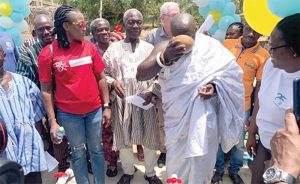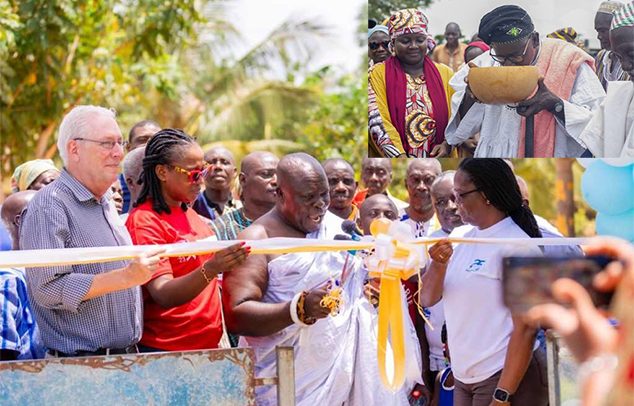Sustainable Development Goals (SDG) also known as the Global Goals are 17 interconnected objectives adopted by the United Nations (UN) in 2015 to guide global development efforts from 2015 to 2030. 193 member states of the United Nations adopted the 2030 agenda of which Ghana is a signature to it.
With a focus on SDG 6, which aims to ensure availability and sustainable management of water and sanitation for all, the role of development partners, non-governmental organisations (NGOs) in helping Ghana achieve the SDG 6.1 – achieve universal and equitable access to safe and affordable drinking water for all, cannot be over emphasised.
Ghana faces significant challenges with its water supply. In a UNICEF Ghana report, about one in 10 people have to spend more than 30 minutes to access an improved source of drinking water while 76% of households are at risk of drinking water contaminated with fecal matter with only 4% of households treat water suitably before drinking, while 93% do not treat water at all.
The report further suggests that, households in the Northern Region are 16 times more likely to spend over 30 minutes collecting water compared to those in Greater Accra.
The role of development partners has become crucial considering these challenges partly caused by the surge in galamsey activities over the years in the country which have destroyed many of the water bodies (rivers and streams). The thirst for clean potable drinking water has increased especially in rural communities within the Ashanti, Eastern, Western and Central regions where the galamsey activities are predominant.
According to records from the Water Resources Commission, about 60% of Ghana’s water bodies have been polluted with waste of illegal gold mining and many in critical conditions. Mercury, cyanide, arsenic and lead can be found in the water in totally unhealthy proportions, posing serious health risks to millions of Ghanaians.
This has caused the increase in water-borne diseases such as cholera and diarrhea, while the mercury and other harmful toxic substances in water have been linked to the increase in kidney problems, respiratory disorders, and other metabolic diseases.
Also, in a Citi news report, Shama District Director of Health, Alfred Osei-Assibey, reacting to the pollution of the Pra River caused by illegal mining activities, revealed that there has been a surge in reported cases of skin infections and water-borne diseases such as diarrhoea.
“In the last three years, skin diseases have been increased dramatically. From the 5,000 cases we recorded in 2017, to 10,000 cases of skin infection currently,” he told Citi news.
The toxic legacy of galamsey has contaminated the water sources, driving communities to seek for alternative water suppliers, often with dire consequences, as many of these water supplies are contaminated with bacterial, pathogens.
Heavy metal contamination in some water sources have caused water treatment plants to shut down, leaving communities without access to safe water. For instance, the Kyebi Treatment plant in the Eastern Region, among others was shut down due to illegal mining pollution.
The devastating consequences of this pollution caused by galamsey operations have also had dire impact on food security, as many farmlands have been taken by illegal mining. Food prices are skyrocketing on daily basis increasing the poverty rate in the country, and affecting the attainment of SDG 1 – No Poverty; SDG 2 – Zero Hunger; SDG 3 – Good Health, and Wellbeing.
SDG goal 17 emphasises on revitalising the global partnership for sustainable development. The 2030 Agenda is universal and calls for action by all countries – developed and developing – to ensure no one is left behind. It requires partnerships between governments, the private sector, and civil society.
This has necessitated development partners such as GIZ, Hive, among others to champion accessible and clean water for all through collaborative partnership with the public sector has seen massive transformation over the years. These individual organisations have invested in water infrastructure and projects which have benefitted many deprived communities.
GIZ 24 Mechanised Boreholes
In commemoration of World Water Day, a UN observance day aimed to raise awareness and inspire action to tackle water and sanitation crisis, German Development Cooperation, GIZ and other partners jointly commissioned 24 mechanised boreholes in the Eastern and Bono regions of the country, following reports of water challenges.
The clean water projects located in underserved and deprived communities such as Nsawam Adoagyir, Manya Krobo, Techiman North, Nkoranza North, Tain, Akuapem South districts and other parts in the Bono Region were constructed under the COVID-19 Comprehensive Pandemic Management for Employees, Families, and Communities to improve water scarcity and make it easily accessible to the vulnerable populations.
The provided water facilities seek to unlock benefits such as health, food and energy security, improved living standards, and education amongst others for the vulnerable communities.
This is also in attainment of Ghana’s SDG 1 – Poverty alleviation; SDG 2 – Zero Hunger; SDG 3 – Good Health and Wellbeing; SDG 8 – Decent work and economic growth, and SDG 7 – Affordable and clean energy.
The Kyidomhene of Oboadaka, Nana Kofi Otu Kofi I, in an interview disclosed the challenges the community faces in accessing clean water for domestic and commercial use. He highlighted the water challenges indigenes in the community face which has affected economic activities.
“We have about six boreholes. However, the water they produce is not too healthy for consumption. After it was completed within a week, the water changes colour and water like that cannot be used for anything meaningful. But the one the GIZ has constructed will sustain the community as it does not change colour,” he said.
Hive Ecosystem Borehole Projects
Hive Ecosystem, a blockchain-based social media platform, has embarked on the construction of borehole water spree in the Ashanti Region and parts of the Northern Region to showcase the water crisis faced by the indigenes. The borehole project, which was first launched on April 17, 2022, has commissioned 17 boreholes.
The borehole project is under the sponsorship of the Decentralised Hive Fund (DHF), to provide access to clean water in rural communities.
Some of the beneficiary communities include Fawoade, Agona Bedomase, Anwomaso, Pentecost School Bremang, Jamasi Dawu, two boreholes at Asamang, Chichibon, Chanshegu, Gbamyamli, Kanvili-Kukuo, Asamankama A and B, Wadie- Adwumakese, Nantong Kpawumo, Dingoni and Kwaagyei.
“If every corporate organisation prioritises water quality and sanitation within their Corporate Social Responsibility (CSR) strategies, it could significantly enhance their profitability while fostering customer loyalty. Consumers are more likely to support institutions that demonstrate genuine care for community welfare.
Additionally, if government institutions allocate a small percentage of their budgets to support water advocacy, it would further amplify the positive impact on communities and create a collaborative effort toward sustainable water solutions,” Dr. Donald Agumenu, Founder of Water for Rural Africa, made this remark in an exclusive interview with the DAILY GUIDE.
He emphasised the urgent need for the government to reevaluate water management systems as a means of tackling the challenges of efficient supply. He raises critical questions about the efficiency of water management, distribution, and piping systems across communities and reservoirs in the country.

“How efficient is the distribution of water? What is the state of our piping infrastructure? These factors are crucial for ensuring that consumers receive value for their money while also allowing Ghana Water Company to operate sustainably,” he mentioned.
Donald Agumenu points to countries like Singapore as examples of effective water management, despite limited access to fresh water. Singapore imports fresh water from Malaysia and has invested heavily in purification systems and desalination technologies. The country maximises land use for rainwater harvesting, demonstrating how a strategic approach to water management can benefit its population.
In Ghana, technology plays a vital role in water security and distribution regulation. While some areas have metering systems in place, there are still communities without them, leading to significant water wastage. This lack of awareness about the true cost of water can have dire consequences, especially for vulnerable populations such as children and pregnant women.
To address these issues, Donald Agumenu advocates for the introduction of miter technological solutions to reduce water wastage in communities. He also highlights pollution as a significant barrier to effective water management. Beyond illegal mining activities, broken pipes often lead to contamination as sewage and other pollutants can infiltrate the water supply.
To build a robust water management system, Donald Agumenu stresses the importance of monitoring and evaluation (M&E) at all levels—from rural communities to urban centers. “By enhancing technical capacity for repairing and maintaining pipes, we can foster a culture of maintenance that addresses issues at their root rather than solely at the top.
“Community-managed water systems should be empowered with technical teams capable of promptly addressing broken pipes. By increasing efficiency at the community level, we can better meet the growing demand for water as the population expands,” he suggested.

Chairman of the Community Water and Sanitation Agency, Mr. Kwasi Eduafo Yankey, in a statement said in spite of the agencies achievements in reducing water deficits in the country, more investments are required for the rehabilitation or reconstruction of several broken-down pipe water systems and provision of new water infrastructure to serve about 8.9 million people who are without access to safe water.
This, he said, would enhance Ghana’s chances of achieving the targets for the Sustainable Development Goal (SDG) 6 and consolidate government’s efforts in combating WASH related diseases in all Ghanaian communities.
By Prince Fiifi Yorke


